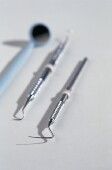Dental Disease May Affect Birth Outcomes in Pakistan
High levels of moderate to severe periodontal disease among Pakistani women is associated with increased risks of stillbirth, neonatal and perinatal death, according to the results of a study published in the May issue of the American Journal of Obstetrics & Gynecology.

THURSDAY, May 8 (HealthDay News) -- High levels of moderate to severe periodontal disease among Pakistani women is associated with increased risks of stillbirth, neonatal and perinatal death, according to the results of a study published in the May issue of the American Journal of Obstetrics & Gynecology.
Naushaba Mobeen, of the Aga Khan University in Karachi, Pakistan, and colleagues conducted a study of 1,152 women who were at 20 to 26 weeks' gestation at baseline. The women, who had a mean age of 27 years and one-third of whom had received no education, underwent dental examination to assess the extent of dental caries, gingivitis and plaque.
Dental caries were detected in 47 percent of the women, 27 percent had missing teeth and 91 percent had received no dental care in the previous 12 months, the researchers report. As measures of periodontal disease (including probing depth, clinical attachment, plaque and gingivitis) increased from the first to the fourth quartile, the investigators found that stillbirth, neonatal and perinatal death all increased as well.
"It is unknown whether the observed association between periodontal disease and adverse pregnancy outcomes reflect cause and effect (periodontal disease leading to preterm birth) or simply an association," the authors write. "Confounding by genital tract infections, low socioeconomic status, smoking, or other factors that are associated with both periodontal disease and preterm birth are possible explanations."
AbstractFull Text (subscription or payment may be required)
Copyright © 2008 ScoutNews, LLC. All rights reserved.